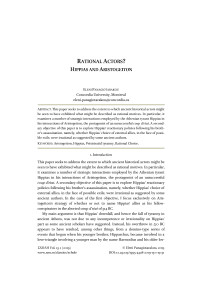Rational actors? Hippias and Aristogeiton
Автор: Panagiotarakou Eleni
Журнал: Schole. Философское антиковедение и классическая традиция @classics-nsu-schole
Рубрика: Статьи
Статья в выпуске: 1 т.13, 2019 года.
Бесплатный доступ
This paper seeks to address the extent to which ancient historical actors might be seen to have exhibited what might be described as rational motives. In particular, it examines a number of strategic interactions employed by the Athenian tyrant Hippias in his interactions of Aristogeiton, the protagonist of an unsuccessful coup d’etat . A secondary objective of this paper is to explore Hippias’ reactionary policies following his brother’s assassination, namely, whether Hippias’ choice of external allies, in the face of possible exile, were irrational as suggested by some ancient authors.
Aristogeiton, hippias, peisistratid tyranny, rational choice
Короткий адрес: https://sciup.org/147215798
IDR: 147215798 | DOI: 10.25205/1995-4328-2019-13-1-19-31
Список литературы Rational actors? Hippias and Aristogeiton
- https://nsu.ru/classics/schole/13/13-1-pan.pdf
- Aristotle. Athenaion Politeia (1952) Translated by Horace Rackham. Loeb Classical Library. London: Harvard University Press.
- Anderson, G. (2003) The Athenian Experiment: Building an Imagined Political Community in Ancient Attica, 508-490 B.C. Ann Arbor, MI: University of Michigan Press.
- Austin, M. M. (1990) "Greek Tyrants and the Persians, 546-479 BC", The Classical Quarterly 40 (02), 289-306.
- Cartledge, P. (2002) The Greeks: A Portrait of Self and Others. Oxford: Oxford University Press.
- Connor, W. R. (1987) "Tribes, Festivals and Processions; Civic Ceremonial and Political Manipulation in Archaic Greece", The Journal of Hellenic Studies 107, 40-50.
- Dover, K. (1997) Greek Homosexuality. New York: MJF Books.
- Ehrenberg, V. (1973) From Solon to Socrates: Greek History and Civilization during the Sixth and Fifth Centuries B.C (2nd ed). London: Methuen.
- Forsdyke, S. (2009) Exile, Ostracism, and Democracy: The Politics of Expulsion in Ancient Greece. Princeton, NJ: Princeton University Press.
- Herodotus (1963) Histories. Translated by A. D. Godley, edited by T.E. Page (2nd ed). London: William Heinemann.
- Holt, P. (1998) "Sex, Tyranny, and Hippias' Incest Dream (Herodotos 6.107)", Greek, Roman and Byzantine Studies 39 (3), 221.
- Hölscher, Tonio (2008) "Images and Political Identity: The Case of Athens", The Athenian Empire, 294-334. Edited by Polly Low. Edinburgh: Edinburgh University Press.
- Lavelle, B. M. (1986) "The Nature of Hipparchus' Insult to Harmodios", American Journal of Philology 107 (3), 318-331.
- Lintott, A. (2014) Violence, Civil Strife and Revolution in the Classical City 750-330 BC. New York, NY: Routledge.
- Lucian (1961) The Works of Lucian. Translated by A. M. Harmon. Cambridge, MA: Harvard University Press.
- Miller, J. D., and Felton, D. (2002) "Using Greek Mythology to Teach Game Theory", The American Economist 46 (2), 69-79.
- Munn, M. (2000) The School of History: Athens in the Age of Socrates. Berkeley: University of California Press.
- Ober, J. (1998) Political Dissent in Democratic Athens: Intellectual Critics of Popular Rule. Princeton: Princeton University Press, 1998.
- Plutarch (2014) Lives. Themistocles and Camillus. Aristides and Cato Major. Translated by Bernadotte Perrin. Cambridge, MA: Harvard University Press.
- Pownall, F. (2013) "A Case Study in Isocrates: The Expulsion of the Peisistratids", Dialogues d'histoire ancienne (Supplément 8), 339-354.
- Sealey, R. (1976) A History of the Greek City States ca. 700-338 B.C. Berkeley: University of California Press.
- Skinner, M. B. (2013) Sexuality in Greek and Roman Culture. Malden, MA: John Wiley & Sons.
- Taylor, M. (1991) The Tyrant Slayers: The Heroic Image in Fifth Century B.C. Athenian Art and Politics (2nd ed). Salem, N.H.: Ayer Co. Publishers.
- Thomas, R (1989) Oral Tradition and written Record in Classical Athens. Cambridge: Cambridge University Press.
- Woodruff, P. (1993) Thucydides: On Justice Power and Human Nature: Selections from the History of the Peloponnesian War. Cambridge, MA: Hackett Publishing Company.


